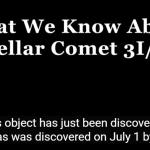Sunday Science: What We Know About Interstellar Comet 3I/Atlas

An interstellar traveler has been discovered passing through our solar system. The NASA-funded ATLAS (Asteroid Terrestrial-impact Last Alert System) survey telescope in Rio Hurtado, Chile, first reported observations of comet 3I/ATLAS on July 1, 2025. Since the first report, additional observations from before the discovery were gathered from the archives of three ATLAS telescopes around the world and Caltech’s Zwicky Transient Facility at the Palomar Observatory in San Diego County, California. These “pre-discovery” observations extend back to June 14. The fast-moving comet, which originated outside our solar system around a different star, was discovered as a tiny speck moving across the vastness of space. When discovered it was about 410 million miles (670 million kilometers) away from the Sun, within the orbit of Jupiter.
This is the third interstellar object ever discovered, hence its name begins with the number 3 and the letter I. Scientists will have several months to observe and study the comet as it passes through our solar system and before it exits. As of July 3, 2025, the comet is just inside the orbit of Jupiter and in late October 2025 it will make its closest approach to our sun from just inside the orbit of Mars. It poses no threat to Earth but offers a fascinating and rare opportunity for scientists to study these interstellar interlopers.
The Jet Propulsion Laboratory (JPL) is a federally funded research and development center (FFRDC) in La Cañada Flintridge, California, Crescenta Valley, United States. Founded in 1936 by California Institute of Technology (Caltech) researchers, the laboratory is now owned and sponsored by NASA and administered and managed by Caltech.
The primary function of the laboratory is the construction and operation of planetary robotic spacecraft, though it also conducts Earth-orbit and astronomy missions. It is also responsible for operating the NASA Deep Space Network (DSN). (Wikipedia)

Can We Fix the Worst Prediction in All of Science?
Ethan Siegel
Starts With A Bang / Big Think
The measured value of the cosmological constant is 120 orders of magnitude smaller than what’s predicted. How can this paradox be resolved?
July 11, 2025
